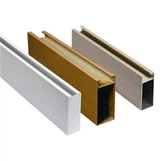Aluminum rectangular tubes have become a staple in various industries due to their unique combination of strength, lightweight properties, and corrosion resistance. As a leading supplier of aluminum rectangular tubes, I've witnessed firsthand the diverse applications and the importance of understanding their dynamic performance. In this blog, we'll delve into what the dynamic performance of aluminum rectangular tubes entails, its significance, and how it impacts different industries.
Understanding Dynamic Performance
Dynamic performance refers to how a material or structure behaves under varying loads and conditions over time. For aluminum rectangular tubes, this includes factors such as fatigue resistance, impact strength, and vibration damping. These properties are crucial in applications where the tubes are subjected to continuous or sudden forces, such as in automotive, aerospace, and construction industries.
Fatigue Resistance
Fatigue is the weakening of a material caused by cyclic loading. Aluminum rectangular tubes are often used in applications where they experience repeated stress, such as in the frames of vehicles or the support structures of bridges. The fatigue resistance of aluminum tubes depends on several factors, including the alloy composition, heat treatment, and the surface finish.
For example, 6063 T52 Aluminum Square Tube is known for its excellent formability and corrosion resistance, which also contributes to its good fatigue performance. The T52 tempering process enhances the tube's strength and hardness, making it more resistant to fatigue cracks.
Impact Strength
Impact strength is the ability of a material to absorb energy during a sudden impact without fracturing. In industries like automotive and aerospace, aluminum rectangular tubes are used in components that may be subjected to high-impact forces, such as crash barriers or aircraft landing gear.
The Rectangle 6061 Aluminium Tubes are a popular choice for such applications due to their high strength-to-weight ratio and good impact resistance. The 6061 alloy contains magnesium and silicon, which enhance its mechanical properties and make it more capable of withstanding sudden impacts.
Vibration Damping
Vibration damping is the ability of a material to dissipate energy when it vibrates. In applications where vibrations can cause noise, discomfort, or even structural damage, such as in machinery or building structures, aluminum rectangular tubes with good vibration damping properties are preferred.
The 6061 T6 Aluminum Rectangular Tubing offers a balance between strength and vibration damping. The T6 tempering process increases the tube's strength while also allowing it to absorb and dissipate vibration energy effectively.
Significance of Dynamic Performance in Different Industries
Automotive Industry
In the automotive industry, aluminum rectangular tubes are used in various components, including frames, suspension systems, and exhaust pipes. The dynamic performance of these tubes is crucial for ensuring the safety and comfort of the vehicle's occupants.
For example, a high fatigue resistance in the frame tubes helps prevent structural failures during long-term use, while good impact strength can protect the vehicle and its passengers in the event of a collision. Additionally, vibration damping properties can reduce noise and improve the overall driving experience.
Aerospace Industry
The aerospace industry demands materials with exceptional dynamic performance due to the extreme conditions and high-stress environments. Aluminum rectangular tubes are used in aircraft structures, such as wings, fuselages, and landing gear.
The lightweight nature of aluminum combined with its high strength and fatigue resistance makes it an ideal choice for these applications. The ability to withstand high-impact forces during takeoff, landing, and flight is essential for the safety and reliability of the aircraft.
Construction Industry
In the construction industry, aluminum rectangular tubes are used in building structures, such as columns, beams, and facades. The dynamic performance of these tubes is important for ensuring the stability and durability of the building.
Good fatigue resistance helps the tubes withstand the long-term effects of wind, seismic activity, and other environmental factors. Impact strength is crucial for protecting the building from accidental collisions or natural disasters. Vibration damping properties can also reduce the risk of structural damage caused by vibrations.
Factors Affecting Dynamic Performance
Alloy Composition
The alloy composition of aluminum rectangular tubes plays a significant role in their dynamic performance. Different alloys have different mechanical properties, which can affect fatigue resistance, impact strength, and vibration damping.
For example, alloys with higher amounts of magnesium and silicon, such as 6061 and 6063, tend to have better strength and corrosion resistance, which can contribute to improved dynamic performance.
Heat Treatment
Heat treatment is a process used to modify the mechanical properties of aluminum tubes. Different heat treatment processes, such as annealing, quenching, and tempering, can affect the tube's hardness, strength, and ductility, which in turn can impact its dynamic performance.
For instance, the T6 tempering process used in 6061 T6 Aluminum Rectangular Tubing increases the tube's strength and hardness, making it more resistant to fatigue and impact.
Manufacturing Process
The manufacturing process of aluminum rectangular tubes can also affect their dynamic performance. Processes such as extrusion, welding, and machining can introduce residual stresses and surface defects, which can reduce the tube's fatigue life and impact strength.
To ensure high-quality tubes with excellent dynamic performance, it's important to use advanced manufacturing techniques and strict quality control measures.
Testing and Evaluation of Dynamic Performance
To accurately assess the dynamic performance of aluminum rectangular tubes, various testing methods are used. These include fatigue testing, impact testing, and vibration testing.
Fatigue Testing
Fatigue testing involves subjecting the tube to cyclic loading until it fails. The number of cycles the tube can withstand before failure is used to determine its fatigue life. This test helps manufacturers and engineers understand how the tube will perform under long-term, repeated stress.


Impact Testing
Impact testing measures the energy absorbed by the tube during a sudden impact. This is typically done using a pendulum or a drop-weight tester. The results of the impact test can be used to evaluate the tube's ability to withstand high-impact forces.
Vibration Testing
Vibration testing involves applying a vibrating force to the tube and measuring its response. This test helps determine the tube's vibration damping properties and its ability to dissipate energy.
Conclusion
The dynamic performance of aluminum rectangular tubes is a complex and important aspect that affects their suitability for various applications. Understanding factors such as fatigue resistance, impact strength, and vibration damping is crucial for selecting the right tube for a specific use.
As a supplier of aluminum rectangular tubes, we are committed to providing high-quality products with excellent dynamic performance. Our range of 6063 T52 Aluminum Square Tube, Rectangle 6061 Aluminium Tubes, and 6061 T6 Aluminum Rectangular Tubing is carefully selected and tested to meet the highest standards.
If you're in need of aluminum rectangular tubes for your project, we invite you to contact us for a detailed discussion about your requirements. Our team of experts is ready to assist you in choosing the best solution for your application.
References
- ASM Handbook Volume 2: Properties and Selection: Nonferrous Alloys and Special-Purpose Materials.
- Aluminum Association. Aluminum Design Manual.
- ASTM International. Standards for Testing and Evaluation of Aluminum Alloys.




